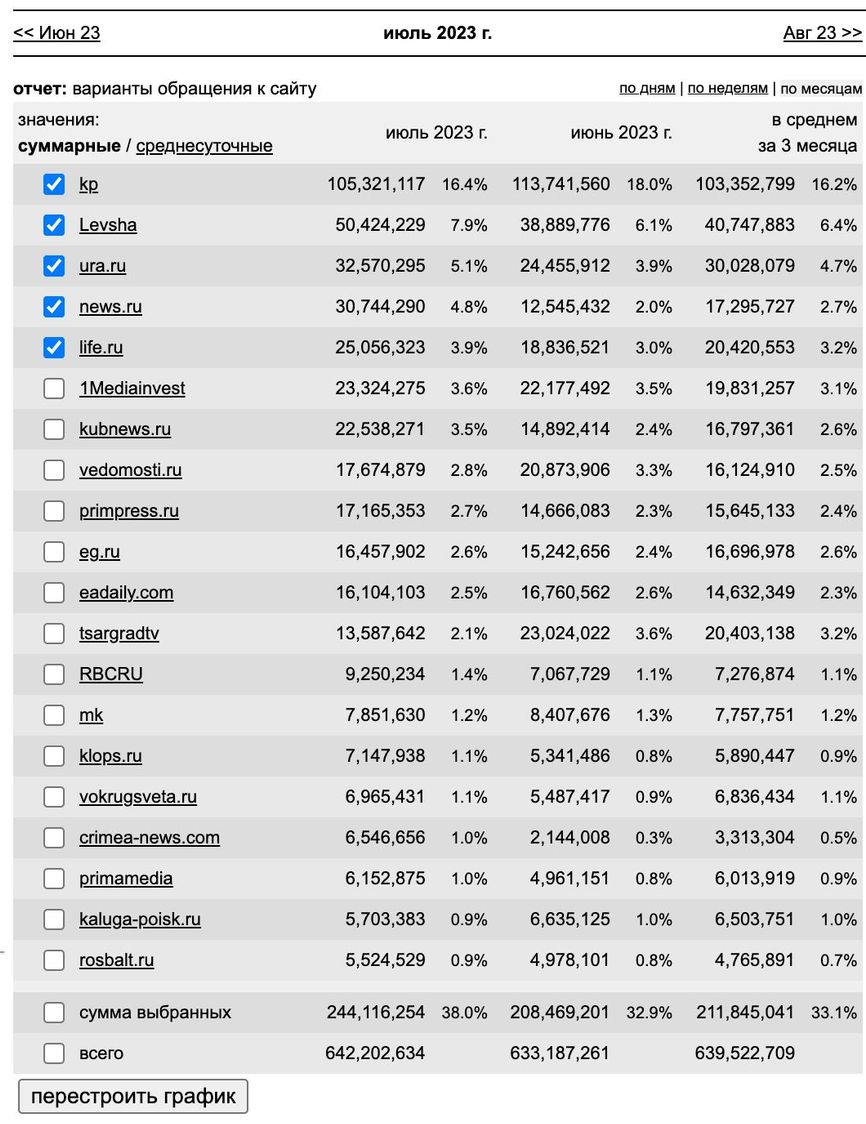
Google initiated the widespread blocking of its services for Russian companies under sanctions on the night of August 10, as reported by business publication Kommersant citing sources in the affected firms. At the same time, Google is aiding Russian authorities in spreading pro-Kremlin news about the war in Ukraine via the Google Discover aggregator. This service, available to Android users on the Google Chrome browser, significantly impacts media traffic, even though it is largely dominated by state media content.
Based on information from liveinternet, Komsomolskaya Pravda, a pro-Kremlin newspaper, garnered the highest number of clicks on Google Discover among Russian media outlets in July 2023, with over 105 million people accessing its content through the service. Following closely is the propaganda portal Ura.ru, with 32.5 million clicks, News.ru with 30.7 million clicks, and Life.ru, which received 25 million hits.

Lev Gershenzon, founder of The True Story news aggregator and former head of Yandex.News (Yandex.Novosti), explained why Google spreads Kremlin propaganda in a conversation with The Insider. Having consistently highlighted the free circulation of false propaganda news through the Google Discover service, pointed out that Google pays attention to what makes money or gets a lot of global media buzz — like articles about anti-Russian sanctions.
“Instead of blocking sanctioned companies, Google could stop spreading Kremlin propaganda. Google is a behemoth with over 100,000 employees and wields more power than many countries, with an audience larger than the population of China or India. There’s no concentrated subjectivity in one person or collective body. I've been struggling with Google Discover for a year now. On one side, there are various priorities like search, YouTube, maps, Google Shopping, and advertising. The company focuses on areas with money and ad income. I've heard from many Google employees that Google Discover isn't well-liked within the company and doesn't receive much attention.
The second point is that Google has its own priorities in terms of markets and languages. It’s clear that the main priority is North America, with Europe in second place. Anything further away, anything using Cyrillic script — that receives much less attention.
Google Discover in Russia lies at the intersection of three minimum-priority areas: there’s no money there due to Google leaving the country. The audience is relatively modest on a global scale. The languages [presented] have a peripheral role for [Google], indicating a lower-quality platform. Given its subpar quality, the platform becomes susceptible to manipulation by the state, which is empowered by its vast resources.
The outcome is clear: Russia's presidential administration is successfully using Google Discover to spread its propaganda and narrative, while Google remains oblivious and disinterested due to the absence of financial gain, business prospects, and positive public relations within the Russian market, unless covered by prominent international outlets like The New York Times, The Washington Post, The Wall Street Journal, Reuters, and Bloomberg. Apart from the money, they also value PR and ‘buzz’ — such as the coverage of topics like US sanctions. The legal risks of violating American sanctions are quite high. A possible situation could arise where a department at Google might say: ‘To reduce risks, let's cut off that platform in Russia. What do we gain? We don't make much money there, and the losses are small compared to the potential risks.’”